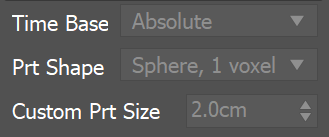Page History
...
| Anchor | ||||
|---|---|---|---|---|
|
...
Example: Inherit TexUVW with Variation
...
| UI Text Box | ||
|---|---|---|
| ||
The following video provides examples of Inherited Texture UVW coordinates repeating along the V-axis over 0, 1 and 2 seconds. When Variation is set to 0, the V coordinate remains static. If Variation is set to 1, it takes one second for a full repetition/tile along the V-axis. |
| Align | ||||||
|---|---|---|---|---|---|---|
| ||||||
|
Emission from Particles
...
| Section | |||||||||||||||||||||||||
|---|---|---|---|---|---|---|---|---|---|---|---|---|---|---|---|---|---|---|---|---|---|---|---|---|---|
|
...

